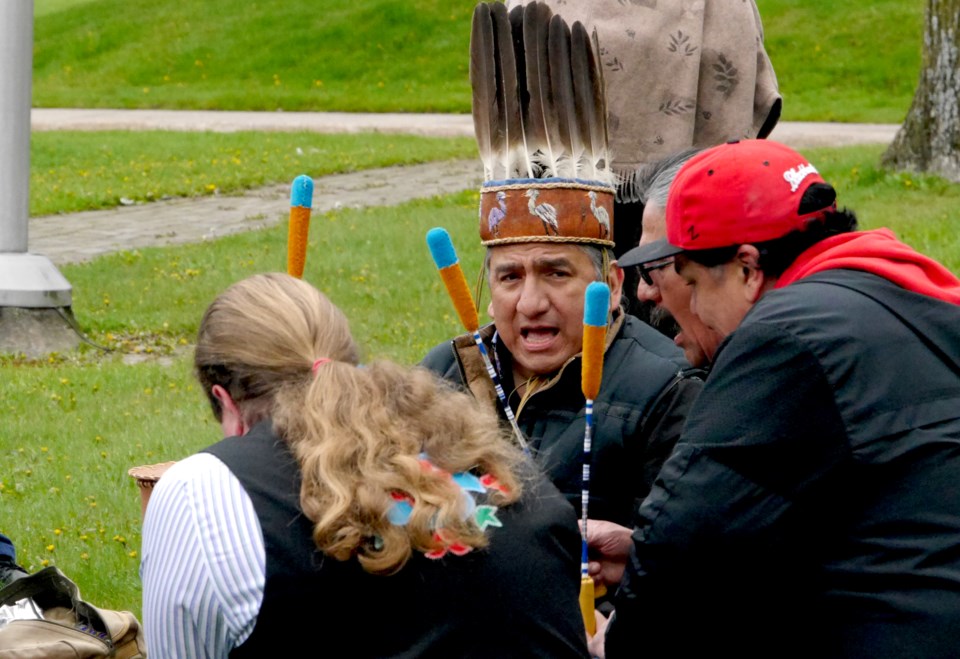Lawyers defending Batchewana First Nation Chief Dean Sayers and three other men accused in an illegal timber harvesting case will fight to prevent the province from withdrawing those charges.
The First Nation had been hoping to use the long-running case to resolve an outstanding jurisdictional argument over logging rights — specifically, that it would uphold Batchewana’s claimed jurisdiction over timber harvesting on its traditional territory north of Lake Superior.
But as a two-week trial was set to begin this morning — nearly eight years after charges were laid — a provincial prosecutor has asked an Ontario Court Judge to allow the Crown leave to withdraw the charges.
“We have every legal document and foundation to support our forest management system, our forest management approach, our licensing system, our sustainable forest processes — we have every right to be able to do that. We’ve researched it exhaustively and I think maybe all the way through Ontario knew that,” said Sayers, outside court this morning.
There is yet more legal wrangling to be done, but Sayers says the process could eventually lead to Batchewana shutting "the entire forest down” to all logging.
In 2008, the Ministry of Natural Resources and Forestry charged three men — Clinton Robinson, Phil Swanson and Gilles Robinson — with harvesting timber without a permit under the Crown Forest Sustainability Act.
Sayers was charged with being a party to those offences.
Sayers said Batchewana sent its loggers into the forest, and once the charges were laid, "in good faith, our loggers came out of the forest," for the eight years it has taken the case to get to this point.
Jennifer Tremblay-Hall, who represents Sayers and two of the charged men, said that at the same time as the Crown is seeking to withdraw the charges, the province has reached out with a last-minute suggestion Batchewana file a land claim that would be expedited by Ontario.
But she calls the offer “disingenuous.”
“Nothing would happen because Canada is not involved,” said Tremblay-Hall.
Sayers said Batchewana isn't interested in a land claim. He said the First Nation's concern is jurisdicution.
"We see this continuation as being sentenced to further poverty," said Sayers in a release.
Lawyers will argue whether the charges should be withdrawn in October, after which another date has been set aside for the defence to argue for the province to pay its costs, which Tremblay-Hall estimates could be close to $300,000 when the expense of expert reports, legal fees and disbursements are added up.
Even if the judge sides with Batchewana and stops the charges from being withdrawn, provincial prosecutors have made it clear they have no intention of going ahead with the case.
The MNRF has made a “firm and final decision that this matter will not be heard on its merits,” Paul Gonsalves, an MNRF prosecutor told Ontario Court Judge Romuald Kwolek this morning.
Gonsalves told the court this morning that even should the judge not grant leave for the charges to be withdrawn, the MNRF has the option to either stay the charges or go to trial and not present any evidence.
“That is the Crown’s position,” said Gonsalves.
Which is why Michael Bennett, who represents Clinton Robinson, is also arguing that if the provincial Crown turns to a stay, that the judge should be able to require that stay be subject to certain terms.
Bennett told SooToday that if a stay is sought, it should be a ‘temporary stay’ while the province shows it is acting in good faith by not laying subsequent charges against the men, and by also negotiating in good faith.
“Until there is such a demonstration on the part of the Crown (Ontario), the charges shouldn’t be stayed,” said Bennett.
Sayers said Batchewana First Nation will be watching to see what happens, and weighing its options should the court case not proceed.
He said one option being considered is to simply ignore the province and have the band’s loggers go back into the forests.
But he said there is history there. When it came to fishing, Sayers said the province hampered Batchewana’s commercial efforts by discouraging the market from buying from them.
“I think at the end of the day, if that’s the approach that Ontario’s going to take we’ll probably end up having to shut the entire forest down,” said Sayers. “if we’re not able to exercise our inherent right, our legal right, then nobody will be in the forest.”
“We’re not going to condone a legislated theft of our resources any longer.”
